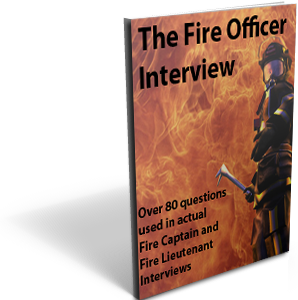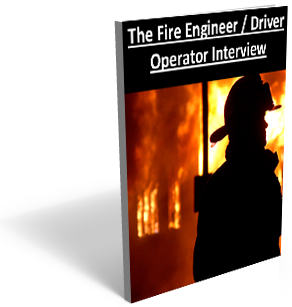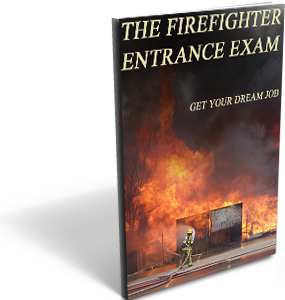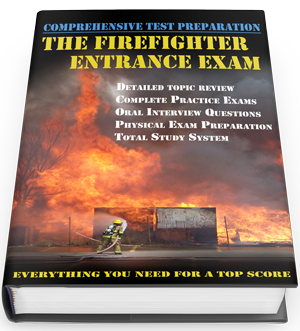Merry Christmas from all of us at myfirejob.com. We hope you’ve all had a great year in the fire service. Take the holiday time to relax and enjoy family. I know quite a few of you have been promoted, congratulations! Looking back at 2014 we added 14 interview questions to our Fire Officer Interview ebook. We added 10 to the Fire Engineer/Driver operator ebook. We added two chapters to our Firefighter Entrance Exam ebook. All in all it was a great year. We look forward to many more.
My Fire Job
Find a job as a firefighter, ace the firefighter entrance exam, get help with fire officer interview questionsBrowsing Posts published by admin
After a long road of studying and then passing the written exam, it will finally be time for the Fire Officer Oral Board. Most candidates will begin looking for books or searching the internet for Fire Officer oral board questions or fire officer interview questions. There are some generic questions on forums and chat rooms, but you probably already know what those are. If you really want to succeed in your interview you need to be studying the difficult questions. You need to be ready for the questions that will catch the other candidates off guard. The best way to prepare for that is with our fire officer interview book. It consists of over 80 high quality interview questions that were used in real interviews. We have compiled these questions from oral board members, retired chiefs, and interviewees. It is the most comprehensive and complete fire officer interview preparation that exists.
Why we are superior:
- We provide the most commonly asked questions,
- then explain the key talking points
- Finally provide a detailed example answer
Here is an excerpt from our book:
23. Describe our department’s progressive discipline policy.
Key Points: You want to answer this question by walking through your department’s disciplinary process from the first step, up to termination. Talk about the officer’s role in each step. Also speak to how you will support decisions that are made at higher ranks regarding the discipline of a subordinate. If appropriate talk about performance improvement plans
Example Answer: Our department’s progressive discipline policy begins with a verbal warning. This takes place between the officer and his subordinate. The officer should explain the situation, lay out a plan for improvement, and hopefully resolve the issue at that step. The next step is a verbal reprimand, which must also be documented by the officer. The officer is also responsible for notifying the Battalion Chief of the incident. The next step is a written warning and a written performance improvement plan. This is done by the officer and Battalion Chief, and presented to the subordinate at a meeting. At this meeting they lay out an improvement plan, and discuss the future steps of discipline if no improvement is made. This is where all expectations must be crystal clear and proper time frames set. The next step is docking pay. This is done at our Battalion Chief level. As an officer, my job will be to continue documenting events, and provide support to the Battalion Chief. The final step is termination. The goal of discipline is not to punish, but rather to improve performance. Depending on the severity of the offense, discipline can begin at any level of process.
You can follow the link below to purchase our book through paypal and download instantly to any device.
Here is a new fire officer promotional interview question and answer that was sent to us by a customer who purchased our book and successfully went through an interview. The question is common in both fire captain and fire lieutenant interviews and has been added to our Fire Officer Interview Book. There are several ways to correctly answer it depending on each department’s procedures, however stressing your commitment to ongoing training and education will always help your cause.
How do you plan on improving the level of training and education in our department?
Training and education are vital to continual improvement. I have constantly worked to improve my level of training and education. I hold a bachelor’s degree in chemistry with an associate’s degree in fire science. I recently began taking classes for a master’s degree in public administration. As you can see from my training summary, I have pursued every available training opportunity since I was hired. I have traveled to other departments to listen to guest speakers and taken national fire academy weekend courses on leadership and decision making skills. My goal is to be the best Lieutenant on this job, and to accomplish that I will continue doing what I have been doing, seeking out every available training opportunity there is. I have brought some of these new ideas back to our department. Recently I gave a class that was based on a propane emergencies class that I attended. There were a few things that I learned that I passed onto our firefighters. I will continue to bring outside perspectives and ideas into our department this way.
What is the best way to prepare for the firefighter entrance exam? This is one of the most common question we are asked, especially from candidates who have never taken a firefighter entrance exam before. We can break this answer down into a few basic principles.
First, begin your preparation early. Firefighter positions are incredibly desireable and therefor very competitive. Many candidates travel great distances to take entry tests for practice. If you have never tested before this places you at a disadvantage right away. Begin your preparations early by refreshing some basic skills you used in high school. These skills are things such as basic math, verbal reasoning, reading comprehension, mechanical aptitude, and reading tables, charts, maps, and graphs. Begin by refreshing your skills in these areas. You can use old textbooks or buy a entrance exam preparation book. We are partial to our firefighter entrance exam preparation ebook because it is so comprehensive.
Second practice taking tests. As we said earlier you can drive to other departments that are testing and take their tests for practice. This is a great tool, but not a cheap option if you have to drive long distances. Another option is to buy a test prep book that includes practice tests, such as ours. These will cover every area that is commonly tested and provide you with an answer key.
Third, be persistent. In this world of instant gratification its hard for many candidates to remain on their journey to be a firefighter if they don’t immediately succeed. Be sure to maintain all of your training and medical certificates during your job search. You never know when positions may open up. Also be sure to keep your resume up to date and accurate.
Below is a link to our Firefighter Entrance Exam Preparation Ebook.
I received an email from a customer who recently purchased our Fire Engineer Interview ebook containing questions used from actual fire engineer interviews. We had a conversation about one question that was not covered in our book and discussed the best way to approach answering it. We have since added the question to our book. Below is an excerpt from his email.
Jason,
Thanks for all of the input with the last emails. My interview was yesterday and consisted of 8 questions and 3 SOG questions. Only one wasn’t covered in your book. I don’t know if I answered it right or not, I would like to hear your thoughts. “As you arrive to work you notice a coworker acting unusual. You smell alcohol on his breath. How will you handle this situation?”
Key Points: This is a situation that is not tolerated. You have no way of knowing how much alcohol is in his system and he is not in any condition to work. The firefighter needs to be immediately removed from all apparatus and send for a fit for duty evaluation. Most departments have a procedure for this. After being removed from duty, he will be disciplined.
Example Answer: This situation cannot be tolerated in any fire station because it is a safety hazard. This individual could harm himself, a crew member, or a citizen. I will make sure that he does not respond to any calls and immediately report the situation to my company officer. This firefighter needs to be removed from the apparatus and sent for a fit for duty evaluation. As an engineer I will not let my truck respond to a call with this individual on board.
This information has been added to our Fire Engineer interview Ebook. It contains over 80 interview questions used in actual fire engineer interviews.
We have posted firefighter job listings in Alaska and Alabama to our firefighter job listings page. The firefighter job listings are organized by state and include links to either the fire department’s home page, or the city’s human resources department. One of these sites will have the information in order to fill out a firefighter application. The application is the first step in the process of getting hired. Our Firefighter Entrance Exam ebook covers the entire application process and then teaches you how to study effectively. It prepares you for each part of the written exam including math, reading comprehension, map reading, memory recall, verbal reasoning, and mechanical aptitude. It also includes a comprehensive section on the physical ability test and the oral interview. After you view our firefighter job listings go ahead and check out of firefighter entrance exam ebook.
Here are a few tips from our book “The Fire Officer Interview“. In addition to covering over 80 interview questions that have been used in actual interview across the United States, we also lay out a comprehensive study system. We have found that this system works very well in teaching candidates to answer questions on the fly by putting their thoughts into concise and thoughtful answers. Part of the study system is a basic set of study tips to maximize information retention. Here are a few of them:
- First you need to set a schedule. People retain information best when it is consistently reinforced. It is beneficial to study at the same time each day, but as long as you are studying consistently every day you will be on the right path. You should always find a quiet place away from distractions and noise. Have the wife take the kids for a walk if that’s what it takes to get some quiet time.
- Start early. As soon as the written test is over you should begin studying for the interview. You can start with SOP/SOG review. Once you know you scored high enough for an interview you can begin studying the interview questions found in our book. The important thing is to start right away so that you’re not cramming. This is vital because as you review the questions and answers over and over you will begin to refine your answers over a period of days and weeks. You will also begin to answer smoothly and remove the “umms” and “awwws” from your speech. This is only possibly through repetition and time, so start early.
- Rehearse like it is the real thing. It is crucial that you speak your answers out loud, rather than voice them in your head. Practice this over and over. Have your wife, parents, or fellow firefighters ask you the questions from our book randomly. Have them make changes and create variations of the scenarios. Put on your jacket and tie if you’re not used to wearing one. You want the practice to be so real that when the big day comes, nothing will feel uncomfortable or out of place.
- Take one day off. We recommend taking a day off two days before the interview. If you have studied as we recommend its time for a break. Go do something to take your mind off the interview. Relax and get rid of the stress. The next day you can do a quick review and be in bed early.
These are some of the tips available in our book “The Fire Officer Interview”. You can purchase the book through paypal and get an instant download.
Our newly updated book with Fire Captain and Fire Lieutenant Interview questions has been updated with several new questions. These came from recent fire captain interviews in California and Texas. Below is one of the newly added questions.
Please describe for the panel the different levels of progressive discipline that a Captain can administer in our department.
Eric’s Answer: Our standard operating procedures are very clear with regard to progressive discipline. The different levels are: coaching, verbal counseling, verbal reprimand, written reprimand, suspension, and termination. As a Captain on the department I can directly administer all levels up to a written reprimand. Suspension and termination are handled by the Battalion Chiefs and Fire Chief. Discipline is the process of correcting unwanted behavior, my goal will be to set clear expectations and correct any problems with coaching, before they grow into larger problems. If I have to move up the discipline ladder I will carefully document all of my actions and keep my Batallion Chief informed of the situation as it progresses. If the process goes to suspension or termination, I will continue to support the command staff and work to correct the problem.
Thanks for the email Eric! You can find this question and many more in our newly updated Fire Officer Interview Book.
We recently spoke with a newly promoted Fire Captain about his oral board interview. We thought his insight might be helpful to those of you who are working to promote in the near future. He is one of our customers and also shared a fire captain oral board interview questions with us. You can find this questions and many more in our Fire Officer Interview ebook.
Jason,
Thanks for all the emails and additional insight into the questions I was struggling with. I had my interview last week and just received the phone call with the official job offer. I can’t tell how much this means to my family and me. Your ebook and numerous emails truely gave me a leg up on the competition. After struggling through previous medic and engineer interviews I knew this one had to be a homerun, and it was. My panel consisted of my fire chief, a deputy chief, and two battalion chiefs. There was also a deputy chief from the police department, and a local district judge on the panel. They each took a turn asking me questions. I think they asked two each for a total of ten questions. Nine of the questions were almost verbatim out of your book. There was only one question I was not fully prepared for. They asked me to explain what discipline meant to me. I was fully prepared to explain the process of progressive discipline and even detail each step, but defining what it meant to me was tricky.
I told them that my interpretation of discipline is to correct behavior that is not up to par or inappropriate by using a progressive discipline policy. I also stated that discipline means being orderly, following standard procedures, and not becoming complacent. I plan on running a disciplined crew in my house and also using discipline to correct any behavior that is out of line.
Thanks again for all your help – Franko
Thanks Franko, I could not have said it any better. You can find Franko’s question and many other Fire Captain Oral Board Interview questions in our Fire Officer Interview Ebook below.
A fire officer interview is arguably one of the most stressful events of your life. Mental preparation is a key to a successful interview. Here are a few ways to be mentally prepped and ready for this critical event.
1. Study regularly. You should not be attempting to cram in the days right before an interview. Set a study schedule and stick to it. The day before the interview should consist of a brief review and some time to relax.
2. Sleep. Numerous study have shown that most people test better if they go to bed rather than forgo sleep to study. The studies also show that getting up early to review is more beneficial than sleeping in late and not reviewing.
3. Eat breakfast. Your body recalls information better when you eat breakfast. It is also shown to improve critical thinking and reasoning skills.
4. Arrive early to the interview. This gives you plenty of time to relax in you car or inside before the stress begins.
5. Know that you studied the correct material. These interviews are incredibly difficult. The biggest way to reduce your stress is to know that you studied the correct material. If you purchased our Fire Officer Interview Questions ebook you will be studying over 85 questions that were used in other Fire Officer interviews. Our customers are reporting that our ebook covers over 90% of their interview questions. This is the single greatest way to reduce stress and build confidence when going into a life changing interview. Below is a link to our product.



